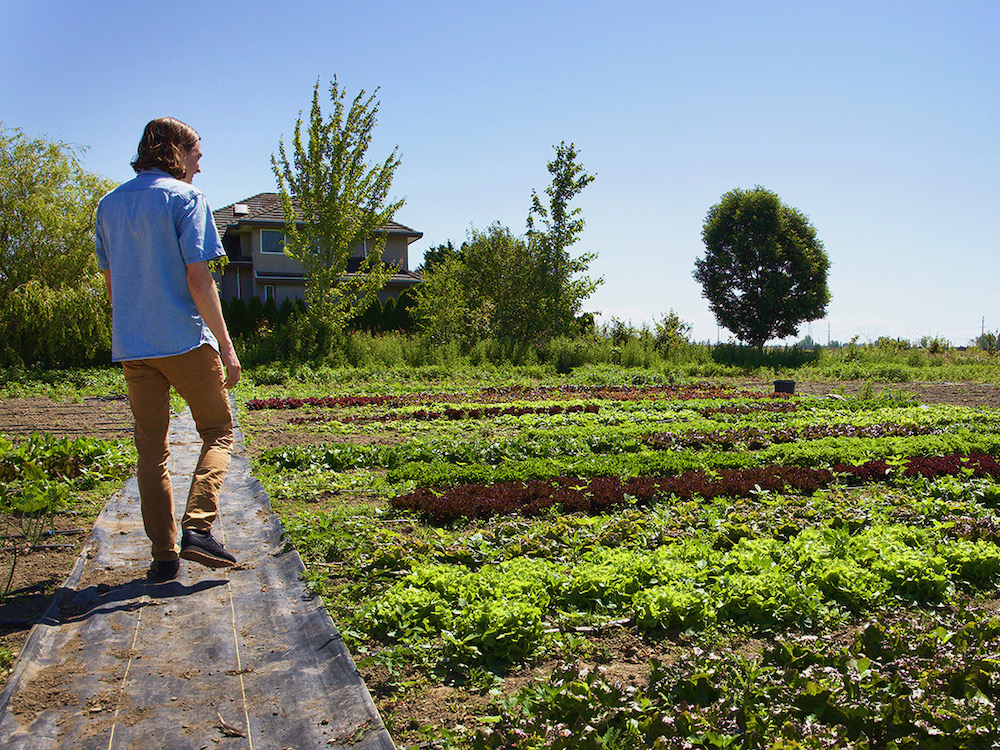Retaining its focus on pollinators, climate change and soil health, West Coast Seeds sells over three million seed packets a year.
Located just off Deltaport Way, West Coast Seeds is hardly the only farm in this agriculture-dominant stretch of B.C.’s Lower Mainland. But it is the only test farm growing multiple non-genetically modified varieties of vegetables, flowers and sustainable lawn alternatives, in search of the best seeds to sell across the country for their garden-growing customers.
On the hot and sunny June day when The Tyee visited West Coast Seeds’ 10-acre plot, home to its storefront and offices, the air was buzzing with pollinators. Birds popped in and out of planters growing new varieties of flowers, looking for bugs to eat.
Next to the parking lot, half a dozen plots have been carved out for testing their new lawn seed blends that include plants like crimson clover, poppies, fescue and purple tansy.
With names like Easy Care Envirolawn and Bee Turf, they provide alternatives to the typical lawn grass in that they are lower maintenance — no mowing required — attract more pollinators, repel pests and are more drought resistant.
“We sell varieties that we believe are better for the environment,” said Aaron Saks, president of West Coast Seeds.
“Kentucky bluegrass just sucks water and doesn’t provide anything to the soil or to the oxygen levels,” Saks said, referring to the typical lawn plant customers can replace with West Coast Seeds’ lawn alternatives.
For the test farm itself, West Coast Seeds tills the soil as little as possible, reduces water usage through irrigation, and attracts birds, pollinators and other local wildlife by growing plants that help feed and house the critters.
In addition to the mental and physical benefits of gardening, the company maintains a focus on healing the Earth. It sells over 1,100 varieties of untreated and non-genetically modified seeds, both hybrid and open pollinated, many of them organic.
Through education and community outreach, West Coast Seeds contributes to a movement in local growing that promotes food security and reduces carbon emissions associated with food transportation.
It all amounts to better health — for “all things that revolve around seeds,” Saks said, such as insects, soil and water.
“We try to do the right thing wherever possible and, for us, that means helping to repair the world,” Saks said.
A culture of sustainability and giving back
West Coast Seeds imports its seeds from all over the world, both open-pollinated and hybrid varieties. (Unfamiliar with these terms? West Coast Seeds offers a handy explainer.)
“Open pollinated in particular, we’re talking about varieties that have a long history,” said Rebecca Morse, product manager for West Coast Seeds. Sometimes it’s a unique colour of flower, but often it’s the distinct flavour of an open-pollinated vegetable variety that keeps customers coming back for more.
“What we look for is a supplier that is maintaining that line well, growing them out, keeping that seed quality high so that it has the attributes that people are looking for,” Morse said.
Hybrid seeds, which are crosses between different varieties of seeds, can have attributes that open pollinated don’t, such as higher drought and temperature-change tolerance and disease resistance, Morse explained.
“Certain crops, it’s very hard to grow in open-pollinated varieties,” Morse said. She offered cabbage, broccoli and cauliflower as examples.
“It’s fantastic to have some hybrids of those crops in particular, to be able to offer our customers better opportunities for success.”
Hybrid seeds help address variations in season length and climate, as well as the weather unpredictability that climate change has wrought.
Morse, who joined West Coast Seeds in December, has worked in the seed industry for over a decade, forming relationships with suppliers all over the world.
“The relationships are really important: getting to know who is producing the seed, feeling good about their practices,” she said. “It matters a lot who that company is and how much integrity they have.”
“They’re responsible for providing seeds to the commercial growers that are feeding us. So they’re absolutely looking for varieties that can withstand these new and unexpected weather patterns,” Morse said.
West Coast Seeds visits test farms for their seed suppliers around North America before purchasing. The company then uses its trial gardens to test seeds for germination rates and ensure they don’t contain weeds. The seeds are then tested by third-party laboratories to confirm they have not been in contact with chemicals or synthetic seeds.
West Coast Seeds’ Delta site also includes gardens planted for the express purpose of attracting pollinators and birds. Its sister company, Urban Bee Supplies, deals in all things honeybee, complementing the work underway at the Delta facility by providing tens of thousands of bees that pollinate its seed-trialling gardens, its greenhouse and staff garden plots at the site.
Over 40 years of organic seed sourcing
West Coast Seeds was founded in Vancouver in 1983 by Mary Ballon, a pioneer of organic gardening and a fierce advocate of local food.
“She couldn’t find organic seeds to grow in her garden,” Saks said. “She’d reach out to other vendors to figure out how to get the [seeds] and then started selling them, because she wanted to have her friends and other people in the community to have those types of seeds as well.”
The holistic, community-minded traditions Ballon established have endured through subsequent owners, most recently the Diamond family, who bought the company in 2014. While organic seed sellers are far more common today, West Coast Seeds still stands out; they’ve retained their initial values as they’ve scaled to offer customers across the country easy, accessible ways to buy seeds both online and at stores across the country.
Over the past decade, the business has boomed. Online orders have more than tripled and so has the number of garden centres the company supplies. When the Diamonds first took over, West Coast Seeds packed fewer than one million seed packets every year, West Coast Seeds marketing specialist Jason Tweten says. Today, it packs nearly three million, many of them destined for its fundraising and donation programs.
A decade ago, West Coast Seeds had less than a dozen full-time employees. Almost everyone was a seasonal employee, laid off at the end of every harvest season. Today, staffing still fluctuates, with about 40 seasonal employees, but the full-time staff has dramatically increased to about 60 people.
Workers at test farms and gardens have different skill sets than your average farmer, Saks said. You’re not growing just one type of cherry tomato at a test farm, for example.
“You’re growing 10 varieties of cherry tomatoes, and they’re all growing close together,” he said. This adds to the manual labour required on the one-acre test garden; other, larger farms can often depend more on machinery to do the job.
Perks of the job include getting your hands dirty, not only metaphorically but literally, too, with each staff member on site given their own raised-bed garden to grow food and flowers. Produce and flowers from the test farm that aren’t donated to charities like local food banks are sent home with staff.
Giving back
Once the dust settled after the early COVID-era gardening boom in 2020, Tweten helped launch the Dr. Bonnie Henry pollinator blend, a packet containing a collection of cosmos seeds, and the company donated 100 per cent of sales — more than $225,000 — to Food Banks Canada.
Other fundraisers have benefited the Canadian Red Cross’s work in Ukraine; the Breakfast Club of Canada, a national non-profit that provides nutritious meals to schoolchildren; and the Red Cross’s Canadian Wildfire Fund.
The company also finds uses for excess seeds, vegetables and flowers from its facility that might otherwise go to waste.
Seeds that aren’t sold over the season are donated to educational programs and charities, such as food bank gardens and school groups. Seed donations have been sent across Canada and the United States, and as far afield as Ukraine, Haiti, Nepal and the Philippines, says Community Roots program co-ordinator Erika Simms.
“The germination is good even years after,” Simms said.
The company often receives dozens of requests for donated seeds every week. “Most of those requests get fulfilled,” Simms said.
Food grown in the test gardens that isn’t sent for assessment — “thousands and thousands of pounds” of it, according to Saks — is donated to food banks throughout the Lower Mainland. Flowers stay in the ground as long as possible to benefit pollinators.
In the winter, the company teams up with schools and other community groups on seed sales that return 40 per cent of profits to the organizations. In recent years, the number of groups accessing the program has increased more than 10-fold, Simms said.
Gardening continues to grow
While the “astronomical growth” for seed companies, including West Coast Seeds, has tapered off, rising food costs have continued to drive home gardening.
The biggest increases in home gardening came from Ontario and Atlantic Canada. This trend has been reflected in West Coast Seeds’ market, which is primarily focused in Western Canada but has seen a shift to the east over the past few years.
Eighty-five per cent of new gardeners live in cities and nearly half of them are under the age of 35, according to research conducted by Dalhousie University.
This research aligns with what they’ve experienced at West Coast Seeds, Tweten said.
“One little investment and you can grow lettuce for the whole summer for a very cheap cost,” Tweten said. “We’re seeing the millennial generation grow, and then we’re seeing the next generation start to get some interest as well.”
Two years ago, West Coast Seeds started a brand ambassador program on social media. It now has 160 personalities promoting its products across Canada and the United States.
Its newsletters offer tips on everything from edible flowers to cover crops, and its website and seed catalogues provide information about crop rotations, companion planting, pest control and how to grow every seed imaginable.
Even young children are getting into gardening, Saks said, as they watch their parents take up the hobby.
It’s an effective way to get kids to eat their veggies.
“It does taste better,” Saks said. “You know what you’re getting.”
This article runs in a new section of The Tyee called ‘What Works: The Business of a Healthy Bioregion,’ where you’ll find profiles of people creating the low-carbon, sustainable economy we need from Alaska to California. Find out more about this project and its funders.
Source: thetyee.ca


